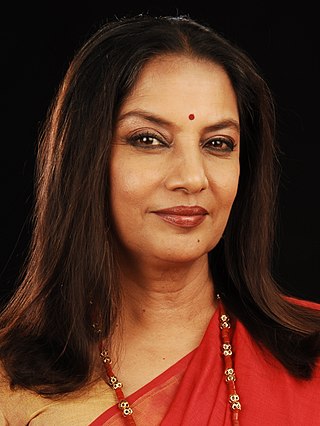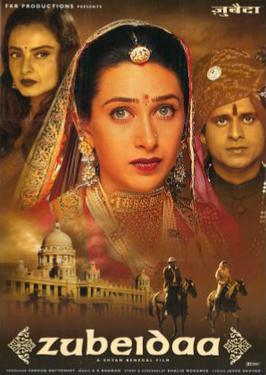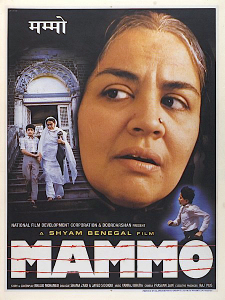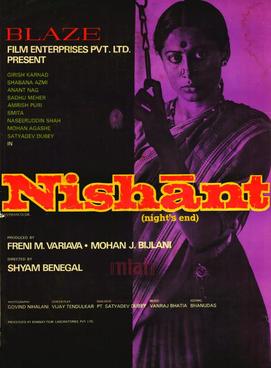Khalid Mohamed is an Indian journalist, editor, film critic, screenwriter and film director. He worked for The Times of India for 27 years and then DNA followed by Hindustan Times and was the lead editor for Filmfare magazine. He is the son of Zubeida Begum, on whose life he wrote the screenplay of Shyam Benegal's 2001 film, Zubeidaa.

Shabana Azmi is an Indian actress of film, television and theatre. Her career in the Hindi film industry has spanned over 160 films, mostly within independent and neorealist parallel cinema, though her work extended to mainstream films as well as a number of international projects. One of India's most acclaimed actresses, Azmi is known for her portrayals of distinctive, often unconventional female characters across several genres. She has won a record of five National Film Awards for Best Actress, in addition to six Filmfare Awards and several international accolades. The Government of India honoured her with the Padma Shri in 1998 and the Padma Bhushan in 2012.

Victor Banerjee is an Indian actor who appears in English, Hindi, Bengali and Assamese language films. He has worked with directors such as Roman Polanski, James Ivory, Sir David Lean, Jerry London, Ronald Neame, Satyajit Ray, Mrinal Sen, Shyam Benegal, and Montazur Rahman Akbar. He won the National Film Award for Best Supporting Actor for the film Ghare Baire. He was awarded the Padma Bhushan, India's third highest civilian award, in 2022 for his huge contribution to cinema by the Indian Government in the field of art.

Zubeidaa is a 2001 Indian film directed by Shyam Benegal and written by Khalid Mohammed. It stars Karisma Kapoor, Rekha, Manoj Bajpayee, Surekha Sikri, Rajit Kapoor, Lillete Dubey, Amrish Puri, Farida Jalal, and Shakti Kapoor. A.R. Rahman has scored the background music and soundtrack for the movie.

Anant Nagarkatte is an Indian actor whose predominant contribution has been in Kannada cinema. He has acted in over 300 films which include over 200 Kannada films as well as Hindi, Telugu, Marathi, Malayalam and English films. He has featured in theatre plays, parallel cinema and television shows.

Smita Patil was an Indian film and theatre actress who primarily worked in Hindi and Marathi films. Regarded among the finest and greatest actresses in the history of Indian cinema, Patil appeared in over 80 films, in a career that spanned over a decade. Patil was the recipient of two National Film Awards, a Filmfare Award, a Maharashtra State Film Award and two Filmfare Awards Marathi. In 1985, she received the Padma Shri, India's fourth-highest civilian honour.

Dev Benegal is an Indian filmmaker and screenwriter, most known for his debut film English, August (1994), which won the Best Feature Film in English at the 42nd National Film Awards.
Shama Zaidi is an Indian screenplay writer, costume designer, art director, theatre person, art critic, and documentary film maker. She is married to director M. S. Sathyu. Shama Zaidi Was Honored with Lifetime Achievement Award at ICA - International Cultural Artifact Film Festival in 2021.
Parallel cinema, or New Indian Cinema, is a film movement in Indian cinema that originated in the state of West Bengal in the 1950s as an alternative to the mainstream commercial Indian cinema.

Ankur is an Indian colour film of 1974. It was the first feature film directed by Shyam Benegal and the debut of Indian actors Anant Nag and Shabana Azmi. Anant Nag was introduced in Ankur by Shyam Benegal in Hindi film after his higher education in Mumbai. The film was shot in Hyderabad. Though Shabana Azmi had acted in other films as well, Ankur was her first release.

Mammo is a 1994 Indian Hindi-language film by Shyam Benegal. It stars Farida Jalal, Surekha Sikri, Amit Phalke and Rajit Kapur.

Nishant is a 1975 Hindi drama film directed by Shyam Benegal, based on an original screenplay by noted playwright Vijay Tendulkar, with dialogues by Satyadev Dubey.

Sardari Begum is a 1996 Indian musical film directed by Shyam Benegal. The film stars Kiron Kher, Amrish Puri, Rajit Kapur and Rajeshwari Sachdev.
Javed Siddiqui is a Hindi and Urdu screenwriter, dialogue writer and playwright from India. He has written over 50 storylines, screenplays and dialogues.

Vanraj Bhatia was an Indian composer best known for his work in Indian New Wave cinema. He was also one of the leading composers of Western classical music in India.

Rajeshwari Sachdev is an Indian actress known for her role in Shyam Benegal's film Sardari Begum (1996), for which she won the 1997 National Film Award for Best Supporting Actress.

Satyadev Dubey was an Indian theatre director, actor, playwright, screenwriter & film director. He was awarded the Sangeet Natak Akademi Award in 1971.
Ravi Jhankal is an Indian television, stage and film actor, mostly known for working in Shyam Benegal's films, including Welcome to Sajjanpur (2008) and Well Done Abba (2010) and for the role of P. V. Narasimha Rao in Pradhanmantri . He is also part of Surnai, Mumbai-based theatre group.
Smriti Mishra is an Indian actress, most known for her roles in Shyam Benegal's Sardari Begum (1996), Sudhir Mishra's Is Raat Ki Subah Nahin (1996), Pamela Rooks's Train to Pakistan (1998), Manish Tiwary's Dil Dosti Etc (2007) and Vijay Singh's Jaya Ganga (1996).

The New York Indian Film Festival (NYIFF) is an annual film festival that takes place in New York City, and screens films relating to India, the Indian Diaspora, and the work of Indian filmmakers. The festival began in November 2001 and was founded by Aroon Shivdasani and the Indo-American Arts Council. About 40 films are screened, including features films, shorts, documentaries, and animated films.















